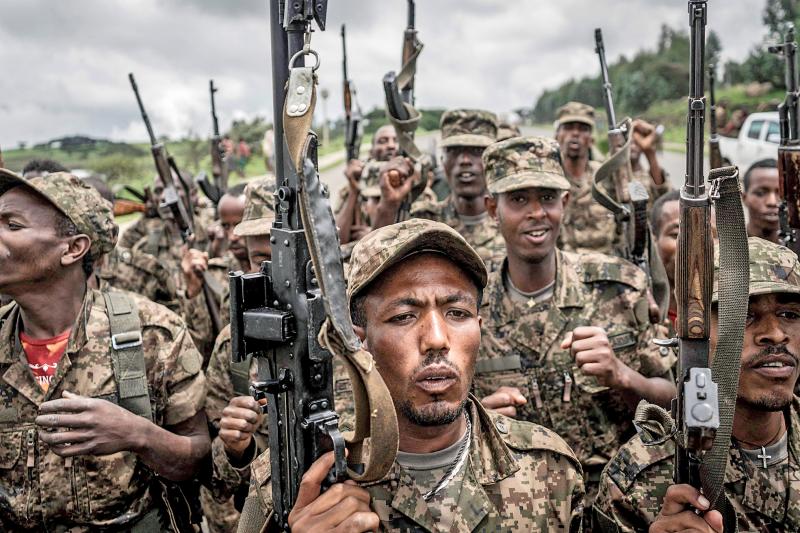Bodies of rebel fighters dot the roads and fields leading to Chenna, a village in the mountains of northern Ethiopia that this month saw one of the most gruesome reported incidents in the country’s 10-month-old war.
Last week, the government accused Tigray People’s Liberation Front rebels of massacring as many as 200 civilians in Chenna, including women and children.
Medics put the death toll at 125, but told reporters that the number could climb.

Photo: AFP
The rebels rejected the allegations, while accusing Ethiopian Prime Minister Abiy Ahmed of sending “priests, women and children” into battle as cannon fodder.
Chenna is in Ethiopia’s Amhara region south of Tigray, where fighting broke out in November last year between pro-government forces and the Tigray People’s Liberation Front.
Despite Abiy vowing a swift victory, fighting has spread in the past few months into Amhara and Afar, displacing hundreds of thousands of people and killing an untold number of civilians.
The violence in Chenna unfolded early this month, and the village — a rambling collection of mud homes — is now mostly empty, its residents driven away by the stench of death.
“We haven’t buried all the people. We have been burying our people who have been massacred. We were doing that for four days straight,” Amhara militia fighter Yalew Kasse told reporters on Tuesday.
Stones and leaves have been placed over a freshly dug mass grave outside the village’s Orthodox Christian church.
Militia fighters said that the graves of still more civilians could be found elsewhere, sometimes right outside their homes.
“They annihilated one whole family — a mother, a father, a four-year-old boy and a six-year-old girl,” Yalew said.
Mebratu Adane, a spokesman for a local militia, said most of the bodies that have not been buried were those of rebels.
“The villagers couldn’t stand the smell of the bodies so they fled,” he said.
The fighting in Amhara has amplified global concern about the war in northern Ethiopia, which has killed many thousands of people and pushed hundreds of thousands into what the UN has called famine-like conditions.
UN High Commissioner for Human Rights Michelle Bachelet on Monday said that the widening war “risks spilling over to the whole Horn of Africa.”
“Even with the changing dynamics in the conflict, there has been one constant: multiple and severe reports of alleged gross violations of human rights, humanitarian and refugee law by all parties,” Bachelet said.
Outside efforts to broker talks have made no visible headway, meaning more intense fighting is likely in the offing.
In Dabat, a town southeast of Chenna, Ethiopian soldiers on Tuesday conducted weapons and fitness drills while preparing to push farther north.
“We’ll beat the junta,” the soldiers sang as they marched through the streets of Dabat once the drills were over, using a pejorative term to refer to the rebels.
“We are planning to go to the north and destroy the junta, and we are well-prepared,” said Colonel Eshetu, who gave only his first name. “We have been training for more than three weeks. Our soldiers are more than capable of destroying the Tigray rebel force.”

In the sweltering streets of Jakarta, buskers carry towering, hollow puppets and pass around a bucket for donations. Now, they fear becoming outlaws. City authorities said they would crack down on use of the sacred ondel-ondel puppets, which can stand as tall as a truck, and they are drafting legislation to remove what they view as a street nuisance. Performances featuring the puppets — originally used by Jakarta’s Betawi people to ward off evil spirits — would be allowed only at set events. The ban could leave many ondel-ondel buskers in Jakarta jobless. “I am confused and anxious. I fear getting raided or even

Kemal Ozdemir looked up at the bare peaks of Mount Cilo in Turkey’s Kurdish majority southeast. “There were glaciers 10 years ago,” he recalled under a cloudless sky. A mountain guide for 15 years, Ozdemir then turned toward the torrent carrying dozens of blocks of ice below a slope covered with grass and rocks — a sign of glacier loss being exacerbated by global warming. “You can see that there are quite a few pieces of glacier in the water right now ... the reason why the waterfalls flow lushly actually shows us how fast the ice is melting,” he said.

Eleven people, including a former minister, were arrested in Serbia on Friday over a train station disaster in which 16 people died. The concrete canopy of the newly renovated station in the northern city of Novi Sad collapsed on Nov. 1, 2024 in a disaster widely blamed on corruption and poor oversight. It sparked a wave of student-led protests and led to the resignation of then-Serbian prime minister Milos Vucevic and the fall of his government. The public prosecutor’s office in Novi Sad opened an investigation into the accident and deaths. In February, the public prosecutor’s office for organized crime opened another probe into

RISING RACISM: A Japanese group called on China to assure safety in the country, while the Chinese embassy in Tokyo urged action against a ‘surge in xenophobia’ A Japanese woman living in China was attacked and injured by a man in a subway station in Suzhou, China, Japanese media said, hours after two Chinese men were seriously injured in violence in Tokyo. The attacks on Thursday raised concern about xenophobic sentiment in China and Japan that have been blamed for assaults in both countries. It was the third attack involving Japanese living in China since last year. In the two previous cases in China, Chinese authorities have insisted they were isolated incidents. Japanese broadcaster NHK did not identify the woman injured in Suzhou by name, but, citing the Japanese